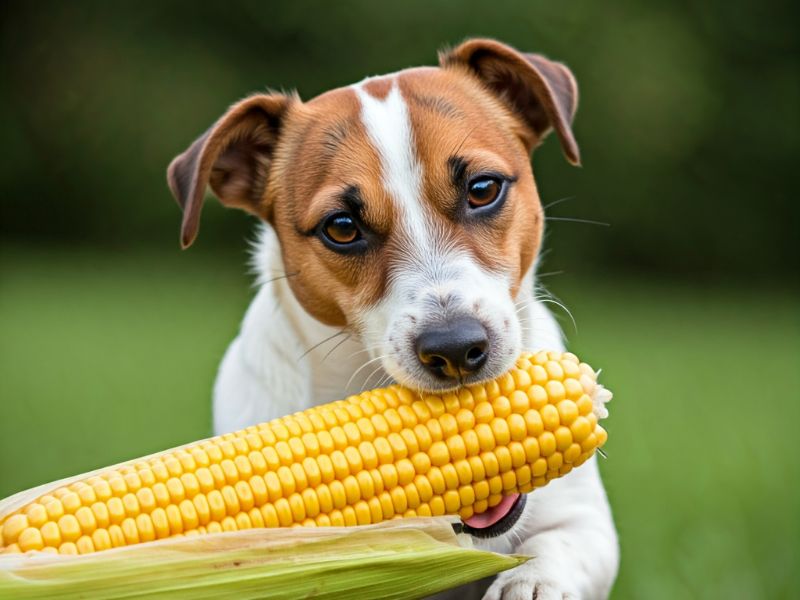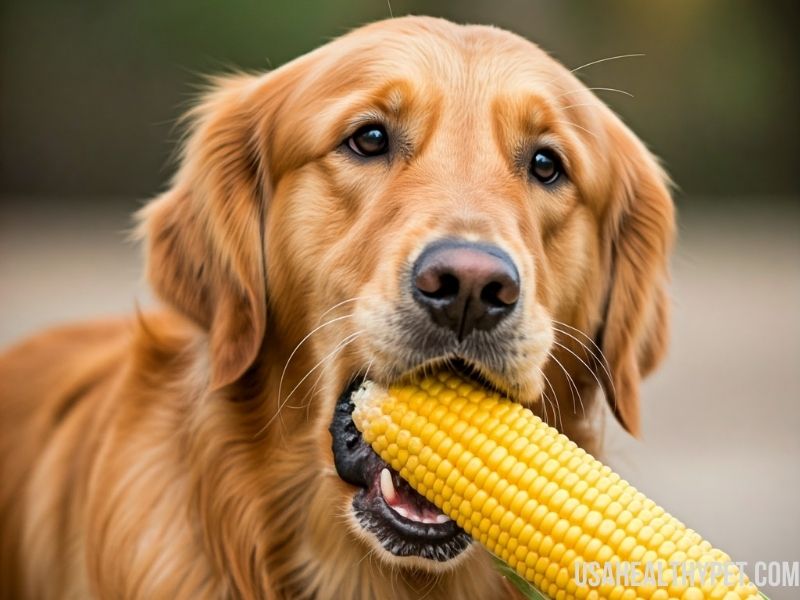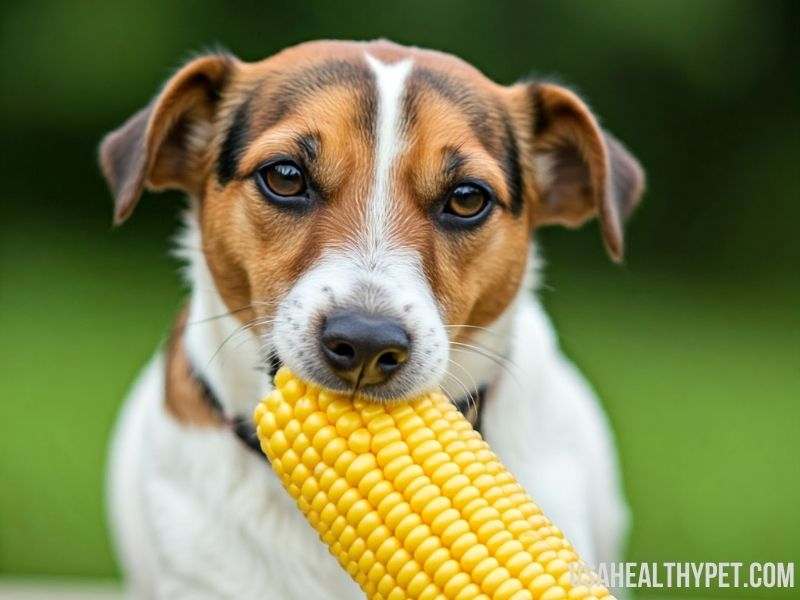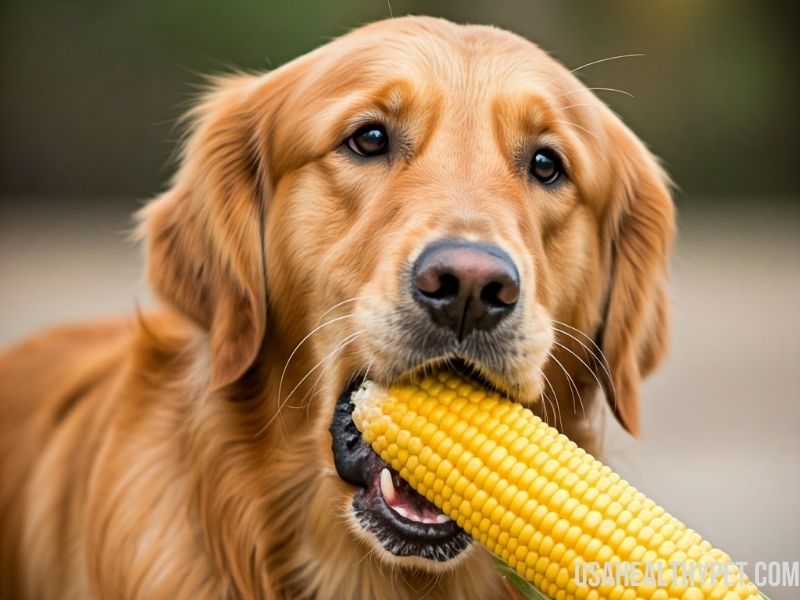You’ve probably heard that corn cobs are dangerous for dogs, and you’re not alone in that worry. According to a report by the American Kennel Club, corn cobs are one of the most common items that lead to gastrointestinal blockages in dogs, which can be life-threatening.
While you might think that your dog seems fine—especially if they’re still pooping—it doesn’t necessarily mean they’re in the clear.
Let’s break down what really happens when a dog eats a corn cob, why it’s dangerous, and what you should do to keep your pet safe.
Why Dogs Eating Corn Cobs Is Dangerous
First things first—corn cobs might seem harmless, but they can actually be very dangerous for dogs. While the corn kernels themselves aren’t toxic (and many dogs love the taste!), the cob is the real problem.
Corn cobs are tough, fibrous, and can’t be digested easily by your dog’s stomach. They can cause blockages in your dog’s digestive system, leading to some serious health issues.
Think of a corn cob like a large piece of wood. It doesn’t break down easily and can get stuck in your dog’s intestines, causing pain, vomiting, and potentially even requiring surgery to remove it.
Can My Dog Pass a Corn Cob?
In some cases, a dog might pass small pieces of a corn cob in their stool. But that doesn’t mean the danger is over.
Larger chunks of the cob can still get lodged in the intestines, which can lead to a blockage. So, even if your dog is pooping after eating a corn cob, don’t assume that everything is fine just yet.

What Should You Do Immediately?
So, your dog ate a corn cob—what now? The first step is not to panic, but also don’t wait around to see what happens. Here’s what you should do:
- Monitor Your Dog: Keep a close eye on your dog’s behavior. Are they acting normal? Are they eating, drinking, and pooping without any issues? If not, that’s a red flag.
- Call Your Vet: Even if your dog seems okay, it’s always a good idea to give your vet a quick call. They can give you advice based on your dog’s size, the amount of corn cob consumed, and the symptoms you’re seeing.
- Don’t Induce Vomiting (Unless Directed by a Vet): In some cases, making your dog throw up can actually make things worse by causing the cob to become lodged in their throat or esophagus.
Signs of a Blockage: What to Watch Out For
You’re probably wondering, “How can I tell if the corn cob is stuck?” Here are some signs of a potential blockage that you should watch for:
- Vomiting: If your dog starts vomiting, especially if it’s persistent or forceful, that’s a sign something is wrong.
- Lack of Appetite: If your dog suddenly refuses to eat, it could mean they’re feeling sick or in pain.
- Lethargy: Is your normally energetic dog acting tired or sluggish? Blockages can drain their energy.
- Straining to Poop: If your dog is trying to poop but nothing is coming out, or their stools are very small or irregular, that might indicate a blockage.
- Abdominal Pain: If your dog seems sensitive when you touch their belly or they’re hunching over, it could be due to internal discomfort.
My Dog Ate a Corn Cob but Is Pooping: Is Everything Fine?
Here’s where it can get tricky. If your dog ate a corn cob but is still pooping, you might think the danger has passed.
However, pooping doesn’t always mean the corn cob has made it through safely. Pieces of the cob can still be lodged in the intestines while your dog is passing smaller bits of stool.
Just because your dog is pooping doesn’t necessarily mean you can breathe easily. It’s still important to monitor their behavior closely over the next 24-48 hours.
According to Dr. Jerry Klein corn cobs are a frequent cause of intestinal blockages in dogs. He explains that because corn cobs don’t break down in a dog’s stomach, they can easily get stuck, leading to symptoms like vomiting, loss of appetite, and severe abdominal pain.
When Should You Call the Vet?

It’s always better to be safe than sorry when it comes to your dog’s health. You should call your vet if:
- Your dog shows any signs of a blockage (vomiting, lethargy, abdominal pain, etc.).
- Your dog isn’t acting like their usual self.
- You’re unsure if your dog passed the corn cob.
- Your dog stops eating, drinking, or pooping altogether.
In any of these cases, don’t wait too long. Corn cob blockages can quickly become life-threatening, and your vet will know what steps to take.
A study by the Pet Poison Helpline points out that corn cobs are one of the most common items dogs swallow that result in emergency surgery. Even small pieces of a corn cob can be risky, especially for smaller dogs, since their intestines are narrower and more prone to blockages.
How Can Vets Help? Treatment and Prevention
If your vet suspects a blockage, they’ll likely do an X-ray or ultrasound to see where the corn cob is stuck. Depending on the situation, treatment might include:
- Inducing Vomiting: If caught early, your vet might try to get your dog to throw up the corn cob before it moves further down the digestive tract.
- Surgery: In more severe cases, surgery may be required to remove the corn cob from your dog’s intestines.
- Supportive Care: If your dog is experiencing mild symptoms, your vet may monitor them closely and offer fluids to help move things along.
Once your dog is safe and sound, prevention is key. Keep corn cobs (and other potentially dangerous foods) out of reach of your dog. It’s amazing how sneaky they can be when they really want something!

Preventing Future Incidents: Keeping Corn Cobs Out of Reach
Let’s be honest—dogs will eat almost anything if given the chance. That’s why it’s important to dog-proof your home, especially during BBQs or family dinners when corn on the cob might be on the menu. Here are some tips:
- Dispose of Corn Cobs Properly: Make sure corn cobs go straight into the trash where your dog can’t reach them.
- Watch Your Dog During Meals: If you’re eating outside or having a BBQ, keep an eye on your dog so they don’t sneak off with anything.
- Train “Leave It” Command: Training your dog to drop or leave items can save you a lot of trouble in the future.
Conclusion
When your dog eats something they shouldn’t—like a corn cob—it’s normal to feel worried. Even if your dog is pooping after eating a corn cob, the risk of a blockage still exists, and it’s crucial to watch them closely.
The key takeaway here? If you ever find yourself in this situation, don’t hesitate to call your vet, monitor for warning signs, and make sure to keep dangerous items out of reach moving forward.
FAQs
1. How long does it take for a corn cob to pass through a dog?
It can vary, but a corn cob might take anywhere from 24-72 hours to pass, if it does at all. Always monitor your dog and consult your vet.
2. Can a small dog pass a corn cob?
Smaller dogs are at greater risk of blockages from corn cobs because their intestines are smaller. Even a small piece can cause trouble, so be extra cautious.
3. Should I make my dog vomit after they ate a corn cob?
No, don’t induce vomiting unless your vet specifically advises it. It could cause more harm than good.
4. What are the first signs of a blockage in dogs?
Vomiting, loss of appetite, lethargy, and trouble pooping are some of the first signs. Contact your vet immediately if you notice any of these.
5. Are corn cobs toxic to dogs?
While corn cobs aren’t toxic, they pose a physical risk because they can cause blockages in the digestive tract, which is why they’re dangerous.

Pingback: Can Dogs Eat Fish Bones? A Complete Guide for Pet Owners
Pingback: Dog Intestinal Blockage Timeline, and Surgery Survival Rate
Pingback: Understanding Inverted Nipples in Dogs: Expert Guide